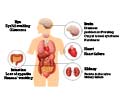A new study published in the journal Neuron reports on the discovery of an abnormal protein.

By analyzing brain tissue from patients with ALS or FTD, Dr. Petrucelli and his team discovered that the abnormal protein, which they call C9RANT, is generated as a result of repeat expansions of nucleotides in the noncoding region of the C9ORF72 gene. These expansions are the most common cause of ALS and FTD. "Simply put, an error in the highly regulated cellular process through which proteins are generated causes the abnormal production of C9RANT," explains Dr. Petrucelli.
The researchers discovered the protein C9RANT after creating a novel antibody to specifically detect it. The ability to detect C9RANT in individuals' cerebrospinal fluid may provide a valuable diagnostic and prognostic tool for identifying patients carrying the C9ORF72 repeat expansion and for then tracking the progression of the disease in these at-risk individuals.
"Although it remains to be shown whether C9RANT is causing the cell death or toxicity associated with disease symptoms, our discovery offers a potential target to prevent neuronal loss in patients carrying the C9ORF72 repeat expansion," says Dr. Petrucelli.
The concept that abnormal proteins accumulate and can be toxic to cells is not new. In fact, tau protein forms tangles in Alzheimer's disease and alpha-synuclein forms clumps in Parkinson's disease. Just as new therapies are being developed to break down the protein aggregates associated with these diseases, developing a therapeutic strategy to target C9RANT aggregates may also prove beneficial.
Advertisement















